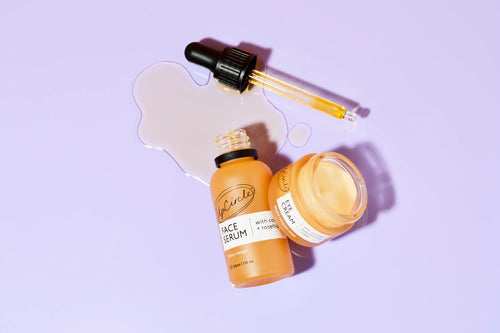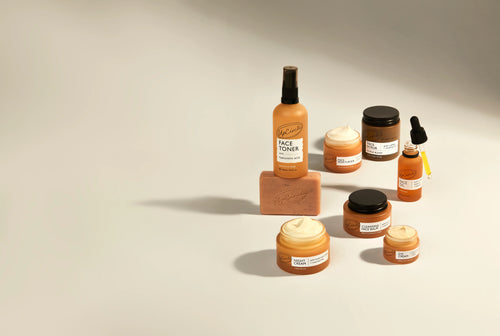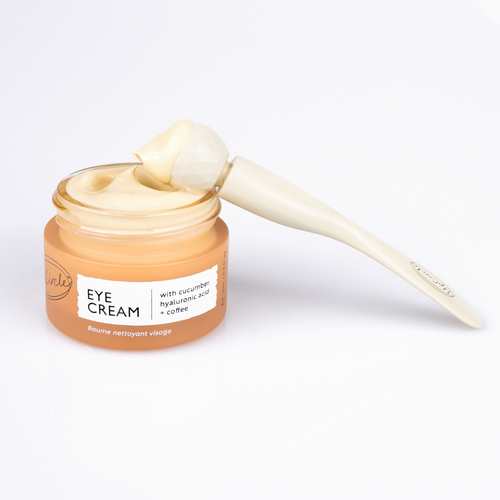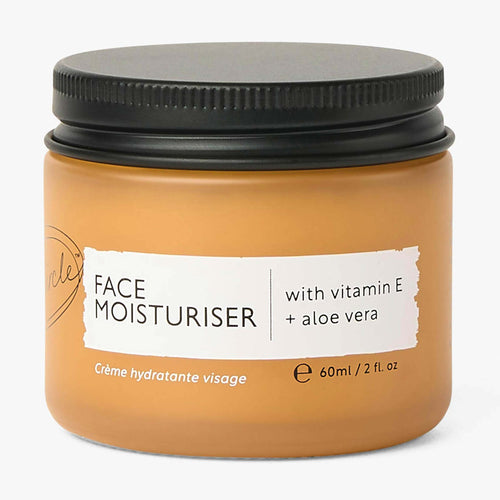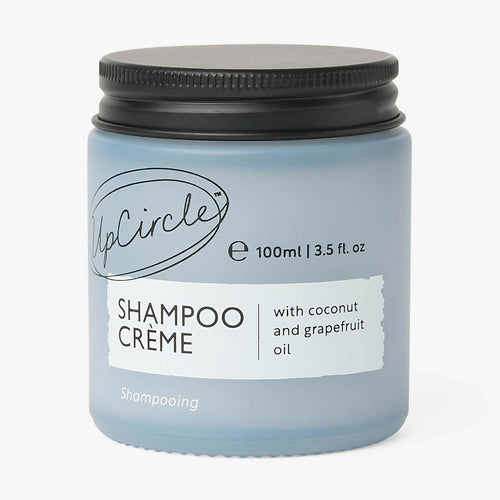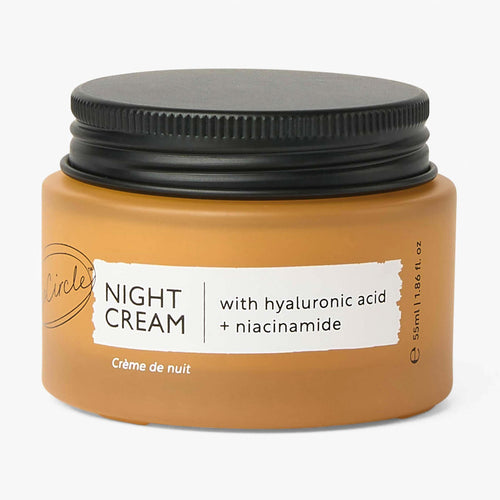We’ve recently changed the name of our mega-popular face serum to face oil. Which may make you wonder – why switch it? Also, is there any difference between face serum and face oil anyway?
We’re also really excited to announce that we've just launched our new peptide face serum. So now feels like a great time to clear up a few questions.
Are face oils and serums the same? If not, what distinguishes one from the other? Read on for our guide to what each is, how they differ, and how to use them.
Face serum vs face oil: all your questions answered
What is face oil?
A face oil is an oil-based formula that’s designed to moisturise the skin. Unlike a moisturiser or serum, it cannot add water to the skin, but a facial oil can help to hydrate skin by sealing in any moisture already present.
Face oils are most effective when used after one or more products that actually add moisture to the skin, such as day cream, night cream, or serum. The creamy oil will then lock in this moisture, so it can hydrate the skin instead of escaping.
Using a face oil can benefit the skin in a number of ways. It can nourish and nurture your skin by increasing moisture levels. This can lead to improvements in texture and tone, resulting in firmer, healthy-looking skin.
Facial oils can be used on the neck and chest as well as the face, providing exactly the same benefits.
What is face serum?
Face serums are lightweight formulas designed to give skin an additional boost. Rather than replacing moisturisers, serums deliver an extra dose of hydration.
Facial serums may also contain special ingredients to target specific concerns. These might include fine lines, pigmented areas, dryness, or dullness. When used regularly, they can improve the appearance and feel of the skin.
As they tend to be thinner, facial serums are usually applied before moisturiser, day cream, or night cream. The creamier, more hydrating product will then seal in the moisture contained in the previous layer. Facial oil can also be used as an additional and more effective waxy barrier, locking in this moisture.
Like face oils and moisturisers, serums can be used on the neck and chest, in addition to the face, to deliver precisely the same benefits.
What’s the difference between face serum and face oil?
The key differences between face serum and face oil are the purpose, the consistency, and when they’re applied.
A face serum is water-based, while a face oil is oil-based. A serum delivers a moisture and nutrient boost to skin, sometimes to target specific concerns. By contrast, facial oil is used primarily to lock in the moisture contained in products such as serums, day creams, and night creams.

Face serum and face oil can complement one another. Serum is applied first to deliver moisture, followed by oil to seal this in. Moisturiser can also be applied between serum and oil, to further hydrate the skin.
Serums penetrate deeper into the skin to hydrate it. Oils create a barrier to keep the surface of the skin smooth while guarding against moisture loss.
Can serum and face oil be used together?
As face serum and face oil are different, you can use them together. Using both enables your skin to absorb all the goodness in the face serum. The application of face oil then ensures it stays right there, where it’s needed, while delivering an additional, nourishing boost, courtesy of the oil’s active ingredients.
As for when to use them, the choice is yours. You can use serums and oils both day and night if you want to, as part of your bi-daily skincare routine. We love using face oil at night, when it can get to work while you sleep. Facial oil can be applied over serum, moisturiser, day cream, or night cream
Do you apply face oil or serum first?
Always apply face serum before facial oil. As serum is water-based, it delivers an instant moisture boost to thirsty skin.
Face oil can then form a protective barrier between facial serum and the environment. This can lock in moisture from both products, as well as the moisture that’s already present in your skin.
The same applies when using moisturiser, day cream, or night cream. Use any of these products first, followed by a layer of facial oil to seal in the moisture, to give your skin a super hydrating boost. For skin in real need of nourishment, you can apply serum, followed by moisturiser, and finally face oil.
If you’re not sure, there’s a simple rule of thumb you can follow: the thinner, more liquid products should be applied first, and the oiliest last. Usually, serums have the most watery formulas, followed by day or night creams and moisturisers. Face oil will always have the thickest, most waxy consistency.

Applying these products in the correct order will seal in the maximum amount of moisture, so your skin can reap the benefits.
Why has UpCircle renamed their face serum to face oil?
If you’ve used our face serum before, you might have noticed that it’s undergone a subtle, but significant, change. Fans will be glad to know that it’s the exact same formula as before. So why is it now known as face oil, rather than serum?
Our face oil – as it’s now known – is 100% oil-based. We've just launched a peptide serum. This new product, by contrast, is water-based. So the new name sets one apart from the other.
Our face oil should also be applied after a water-based serum or moisturiser. The new name therefore clarifies when in your beauty routine the face oil should be used.
The UpCircle Face Oil is infused with coffee, rosehip and jojoba oil; these hero ingredients boost collagen, fade dark spots and lock in hydration.
While our brand new UpCircle Peptide Serum is packed with niacinamide and vitamin C, as well as upcycled custard apple for a hydration boost and plenty of other benefits

